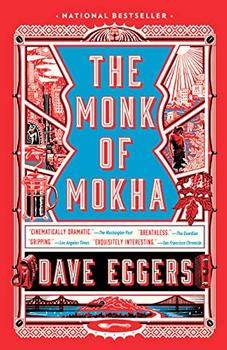Summary | Excerpt | Reading Guide | Reviews | Beyond the Book | Readalikes | Genres & Themes | Author Bio

Prologue
Mokhtar Alkhanshali and I agree to meet in Oakland. He has just returned from Yemen, having narrowly escaped with his life. An American citizen, Mokhtar was abandoned by his government and left to evade Saudi bombs and Houthi rebels. He had no means to leave the country. The airports had been destroyed and the roads out of the country were impassable. There were no evacuations planned, no assistance provided. The United States State Department had stranded thousands of Yemeni Americans, who were forced to devise their own means of fleeing a blitzkrieg—tens of thousands of U.S.-made bombs dropped on Yemen by the Saudi air force.
I wait for Mokhtar (pronounced MOKH-tar) outside Blue Bottle Coffee in Jack London Square. Elsewhere in the United States, there is a trial under way in Boston, where two young brothers have been charged with setting off a series of bombs during the Boston Marathon, killing nine and wounding hundreds. High above Oakland, a police helicopter hovers, monitoring a dockworkers' strike going on at the Port of Oakland. This is 2015, fourteen years after 9/11, and seven years into the administration of President Barack Obama. As a nation we had progressed from the high paranoia of the Bush years; the active harassment of Muslim Americans had eased somewhat, but any crime perpetrated by any Muslim American fanned the flames of Islamophobia for another few months.
When Mokhtar arrives, he looks older and more self-possessed than the last time I'd seen him. The man who gets out of the car this day is wearing khakis and a purple sweater-vest. His hair is short and gelled, and his goatee is neatly trimmed. He walks with a preternatural calm, his torso barely moving as his legs carry him across the street and to our table on the sidewalk. We shake hands, and on his right hand, I see that he wears a large silver ring, spiderwebbed with detailed markings, a great ruby-red stone set into it.
He ducks into Blue Bottle to say hello to friends working inside, and to bring me a cup of coffee from Ethiopia. He insists I wait till it cools to drink it. Coffee should not be enjoyed too hot, he says; it masks the flavor, and taste buds retreat from the heat. When we're finally settled and the coffee has cooled, he begins to tell his story of entrapment and liberation in Yemen, and of how he grew up in the Tenderloin district of San Francisco—in many ways the city's most
troubled neighborhood—how, while working as a doorman at a high-end apartment building downtown, he found his calling in coffee.
Mokhtar speaks quickly. He is very funny and deeply sincere, and illustrates his stories with photos he's taken on his smartphone. Sometimes he plays the music he listened to during a particular episode of his story. Sometimes he sighs. Sometimes he wonders at his existence, his good fortune, being a poor kid from the Tenderloin who now has found some significant success as a coffee importer. Sometimes he laughs, amazed that he is not dead, given he lived through a Saudi bombing of Sana'a, and was held hostage by two different factions in Yemen after the country fell to civil war. But primarily he wants to talk about coffee. To show me pictures of coffee plants and coffee farmers. To talk about the history of coffee, the overlapping tales of adventure and derring-do that brought coffee to its current status as fuel for much of the world's productivity, and a seventy-billion-dollar global commodity. The only time he slows down is when he describes the worry he caused his friends and family when he was trapped in Yemen. His large eyes well up and he pauses, staring at the photos on his phone for a moment before he can compose himself and continue.
Now, as I finish this book, it's been three years since our meeting that day in Oakland. Before embarking on this project, I was a casual coffee drinker and a great skeptic of specialty coffee. I thought it was too expensive, and that anyone who cared so much about how coffee was brewed, or where it came from, or waited in line for certain coffees made certain ways, was pretentious and a fool.
Excerpted from The Monk of Mokha by Dave Eggers. Copyright © 2018 by Dave Eggers. All rights reserved. No part of this excerpt may be reproduced or reprinted without permission in writing from the publisher.
Your guide toexceptional books
BookBrowse seeks out and recommends the best in contemporary fiction and nonfiction—books that not only engage and entertain but also deepen our understanding of ourselves and the world around us.